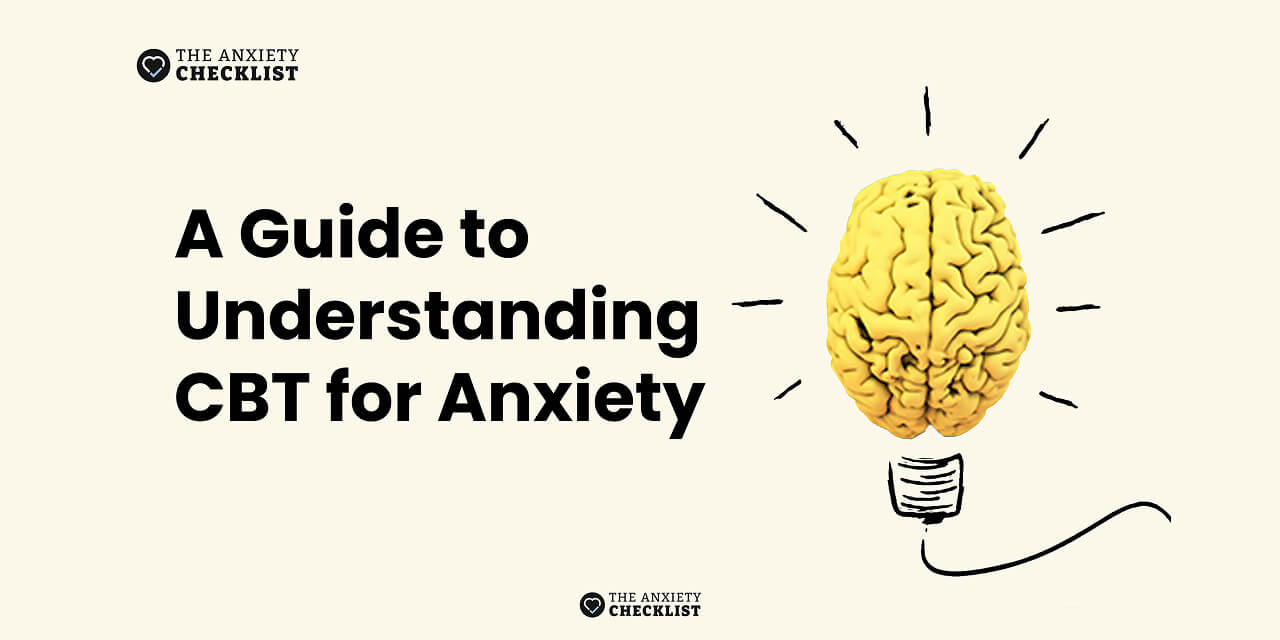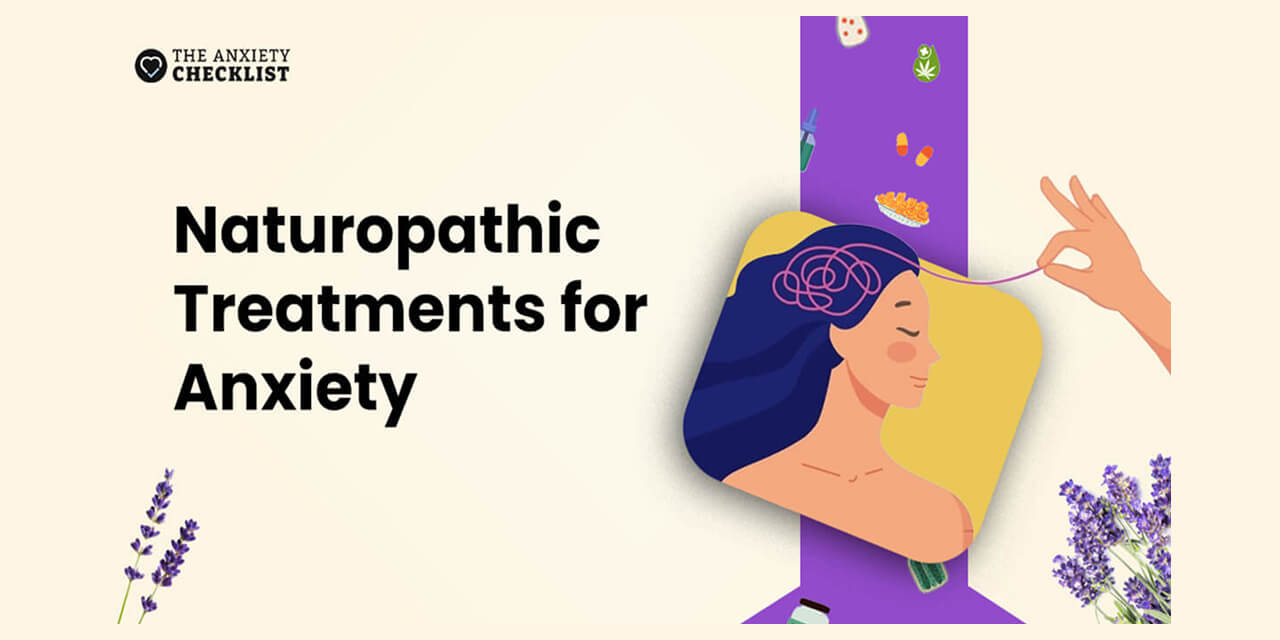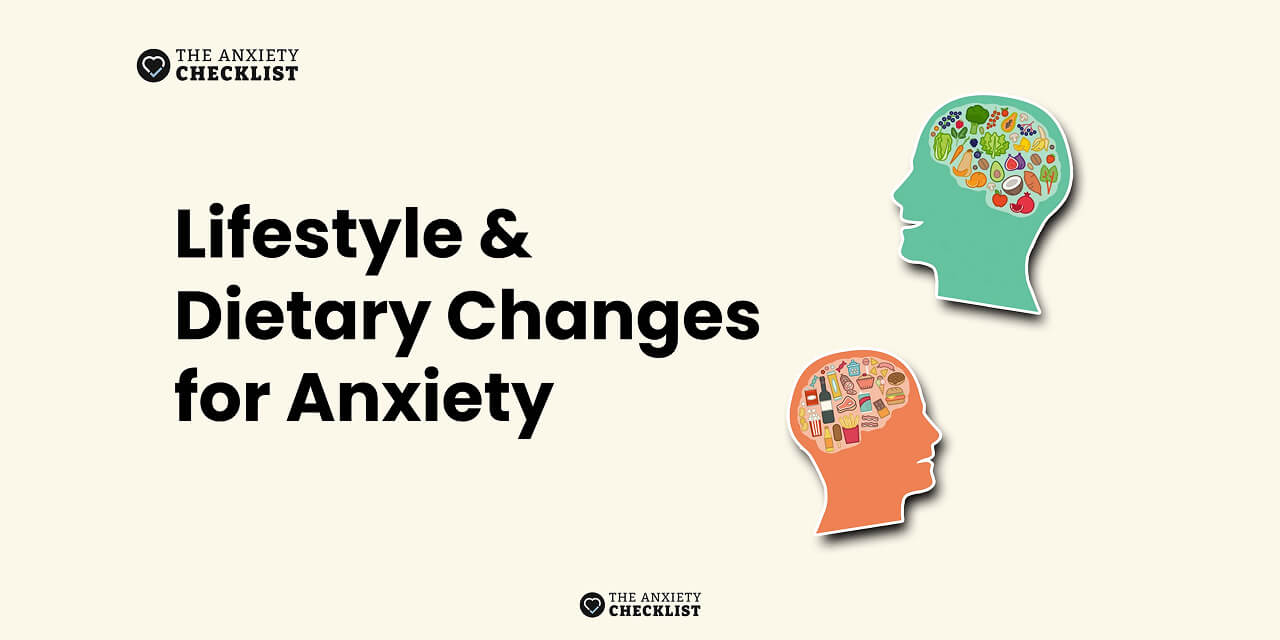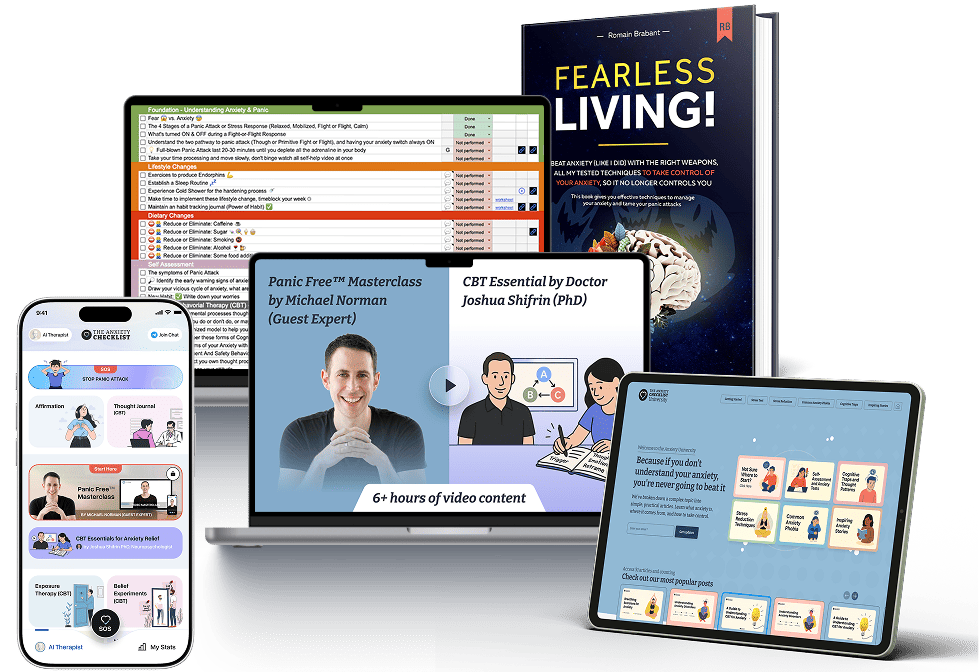
Understanding CBT for Anxiety: An Evidence-Based Approach to Mental Wellness
About The Author
Mike is a compassionate and skilled mental health professional dedicated to helping clients uncover their best selves. At Modern Therapy Group, he provides a supportive space for individuals to explore challenges and work toward meaningful, lasting change.
Specializing in anxiety, ADHD, and addictions, Mike combines evidence-based approaches like Cognitive Behavioral Therapy (CBT) with hypnotherapy to engage both the conscious and subconscious mind in the healing process. He takes pride in his adaptable, client-centered approach, incorporating humor, mindfulness, and practical strategies into each session.
- With a Master of Science degree from Texas A&M University and certification in Trauma-Informed CBT, Mike draws on his extensive experience teaching and presenting since 2006 to connect with clients in a relatable and impactful way. Whether you're feeling stuck, battling anxiety, or striving for balance, Mike is here to guide you toward greater clarity and fulfillment in your life.
When anxiety hits, do you know what to do next?
Learn how to calm your body, interrupt fear loops, and regain control step by step.
CBT Helps with Different Types of Disorders
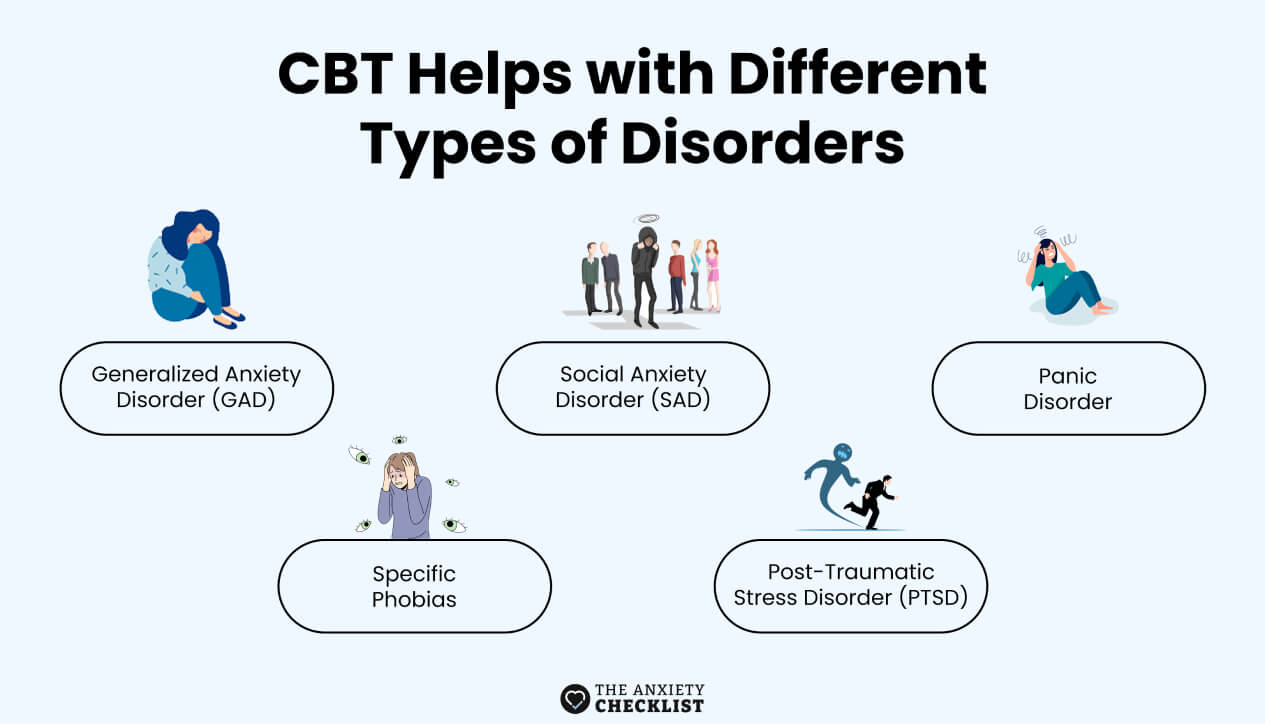
CBT's impact is far-reaching, with extensive research supporting its efficacy for various forms of anxiety, including:
- Generalized Anxiety Disorder (GAD): Characterized by chronic worry and tension.
- Social Anxiety Disorder (SAD): Marked by fear of social situations and judgment.
- Panic Disorder: Involving sudden episodes of intense fear, often accompanied by physical symptoms.
- Specific Phobias: Irrational fears of particular objects or situations.
- Post-Traumatic Stress Disorder (PTSD): Anxiety following a traumatic event.
- What makes CBT particularly transformative is its collaborative and goal-oriented nature. The therapist and client work together to break the cycle of anxiety by targeting specific triggers, identifying unhelpful thinking patterns, and experimenting with new behaviors. Through structured interventions and repeated practice, CBT empowers clients to develop greater confidence in managing their symptoms.
- One of the key strengths of CBT is its adaptability. Over time, CBT has evolved to incorporate additional techniques, such as mindfulness and acceptance strategies, further enhancing its effectiveness. These integrations have made CBT a flexible and accessible approach, suitable for diverse populations and cultural contexts.
- In the years since its inception, CBT has solidified its place as a cornerstone of modern psychotherapy. Its robust evidence base has been validated through numerous clinical trials and meta-analyses, consistently demonstrating its effectiveness in reducing anxiety symptoms. It is widely recommended as a first-line treatment by leading mental health organizations, including the American Psychological Association (APA) and the National Institute for Health and Care Excellence (NICE).
- Ultimately, CBT represents more than just a therapeutic model—it is a testament to the power of evidence-based practices in transforming lives. By equipping individuals with the tools to understand and reframe their thought processes, CBT not only alleviates anxiety but also fosters resilience, self-awareness, and long-term mental wellness.
The Science Behind CBT: Empirical Evidence Overview
How CBT Works
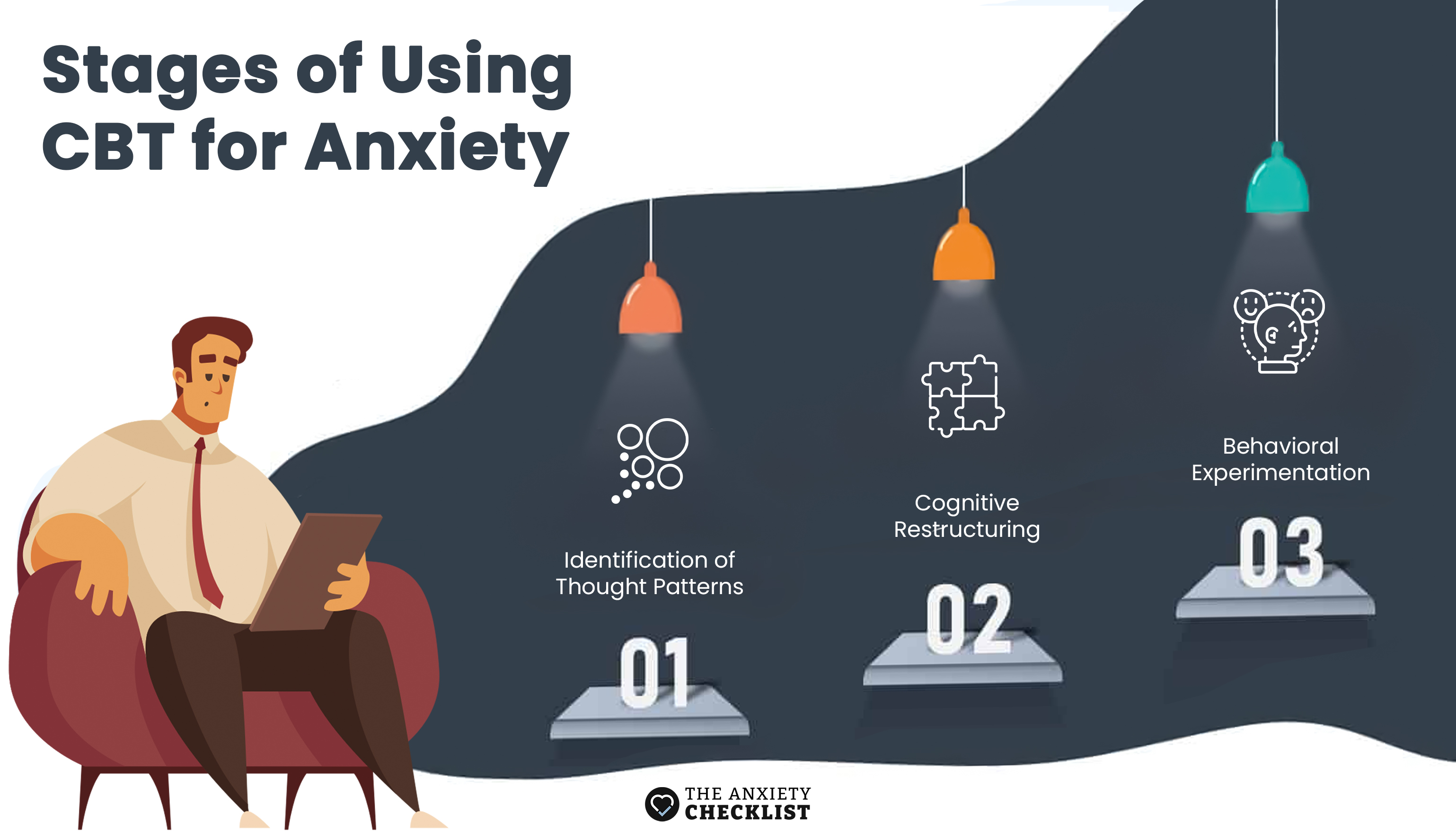
- 1.Identification of Thought Patterns: Clients learn to recognize automatic negative thoughts and cognitive distortions that contribute to anxiety. These might include catastrophizing ("Everything will go wrong!") or overgeneralization ("I always mess up in social situations").
- 2.Cognitive Restructuring:Through guided practice, individuals develop skills to challenge and modify unhelpful thought patterns. This involves examining evidence for and against anxious thoughts and developing more balanced perspectives.
- 3.Behavioral Experiments:Clients gradually face anxiety-provoking situations in a controlled, systematic way, allowing them to gather evidence that challenges their fears and builds confidence.
Core CBT Techniques for Anxiety Management Mindfulness & Present-Moment Awareness
Recent studies have shown that incorporating mindfulness practices into CBT can enhance its effectiveness. Mindfulness helps individuals:
- Notice anxious thoughts without becoming entangled in them
- Stay grounded in the present rather than worrying about future scenarios
- Develop a more accepting relationship with anxiety symptoms
Exposure Therapy: A Cornerstone of CBT for Anxiety
- One of the most effective techniques within Cognitive Behavioral Therapy (CBT) for anxiety is exposure therapy—a systematic, evidence-based process that helps individuals confront their fears in a controlled and supportive environment. Exposure therapy is particularly effective for anxiety disorders such as phobias, social anxiety disorder (SAD), and post-traumatic stress disorder (PTSD). By directly addressing avoidance behaviors that maintain and exacerbate anxiety, exposure therapy empowers clients to build confidence and reshape their relationship with feared situations.
The Process of Exposure Therapy
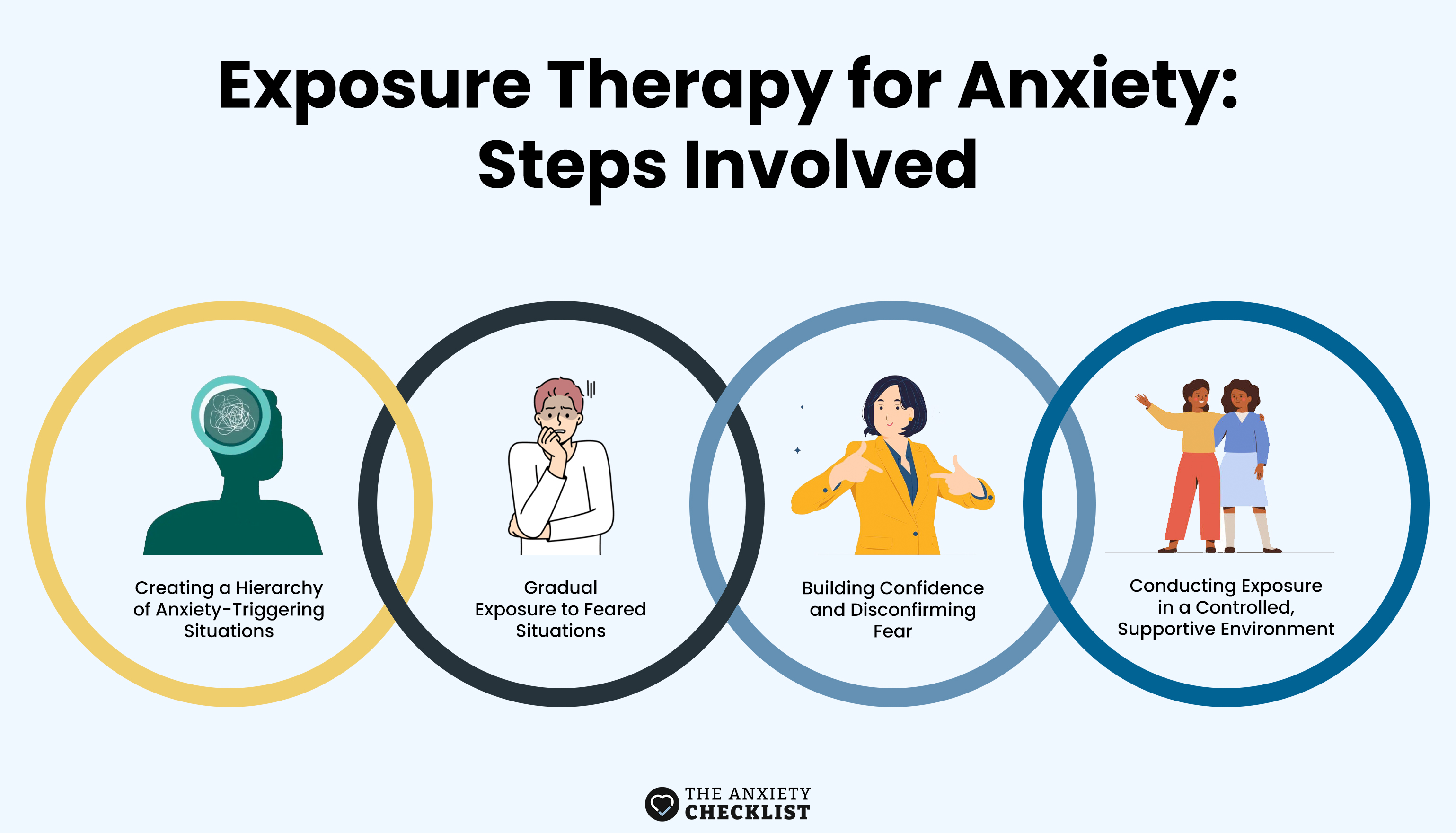
Exposure therapy involves the following structured steps to ensure both effectiveness and emotional safety: (Buchholz & Abramowitz, 2020)
- 1.Creating a Hierarchy of Anxiety-Triggering SituationsThe process begins by collaboratively developing a hierarchy of feared situations. This hierarchy ranks anxiety-provoking scenarios from least to most distressing, allowing the therapist and client to identify manageable starting points. For instance, an individual with social anxiety might rank "making small talk with a friend" as less distressing than "giving a presentation at work." This step ensures the process is tailored to the client's specific fears and capacity for engagement.
- 2.Gradual Exposure to Feared SituationsClients begin with less challenging scenarios and progress to more difficult ones over time. This graded exposure allows individuals to experience success at lower levels of anxiety, building confidence and reducing fear incrementally. For example, a client with a fear of public speaking might start by reading aloud to themselves, then practice speaking in front of one trusted person, eventually working up to presenting to a small group. Gradual exposure reduces the risk of overwhelming the client and encourages sustained progress.
- 3.Building Confidence and Disconfirming FearExposure therapy provides opportunities for clients to collect evidence against their fears. Through repeated exposure, they learn that feared outcomes are often less likely or less catastrophic than anticipated. For instance, a client who avoids elevators due to fear of being trapped might repeatedly ride an elevator, gradually realizing that the experience is uneventful and manageable. This process not only reduces anxiety in specific situations but also fosters a broader sense of confidence and emotional resilience.
- 4.Conducting Exposure in a Controlled, Supportive EnvironmentThe therapeutic setting ensures that exposure is conducted safely, with the therapist offering guidance, encouragement, and coping strategies throughout. Techniques such as mindfulness, relaxation exercises, or cognitive reframing may be incorporated to help clients manage anxiety during exposure. This supportive framework enables clients to fully engage in the process while feeling validated and understood.
The Science Behind Exposure Therapy
- Avoidance behaviors—common in anxiety disorders—temporarily reduce fear but ultimately reinforce it by preventing individuals from challenging their anxious thoughts. Exposure therapy disrupts this cycle by reducing avoidance and safety behaviors, which are actions taken to minimize perceived threats (e.g., leaving a crowded room, clenching fists to "prevent" fainting). Through exposure, clients directly confront the feared situation without these crutches, allowing the brain to undergo a process called habituation.
- Habituation occurs as the brain becomes accustomed to the feared stimulus, leading to a natural reduction in anxiety over time. This process is supported by research showing that repeated exposure can diminish the brain's fear response, particularly in the amygdala, while strengthening the prefrontal cortex's ability to regulate emotions (Craske et al., 2008).
Case Example: Social Anxiety and Exposure Therapy
- Consider a client with severe social anxiety who avoids speaking in group settings. Together, the therapist and client create a hierarchy of social situations, starting with lower-stress scenarios like ordering coffee at a café and gradually working toward participating in group discussions at work. During each exposure, the therapist encourages the client to note their physical sensations, thoughts, and the actual outcome of the situation. Over time, the client observes that their feared outcomes (e.g., being judged or ridiculed) rarely occur and that even mild discomfort dissipates with practice. This structured exposure not only reduces fear in specific situations but also builds confidence across broader social contexts.
Long-Term Benefits of Exposure Therapy
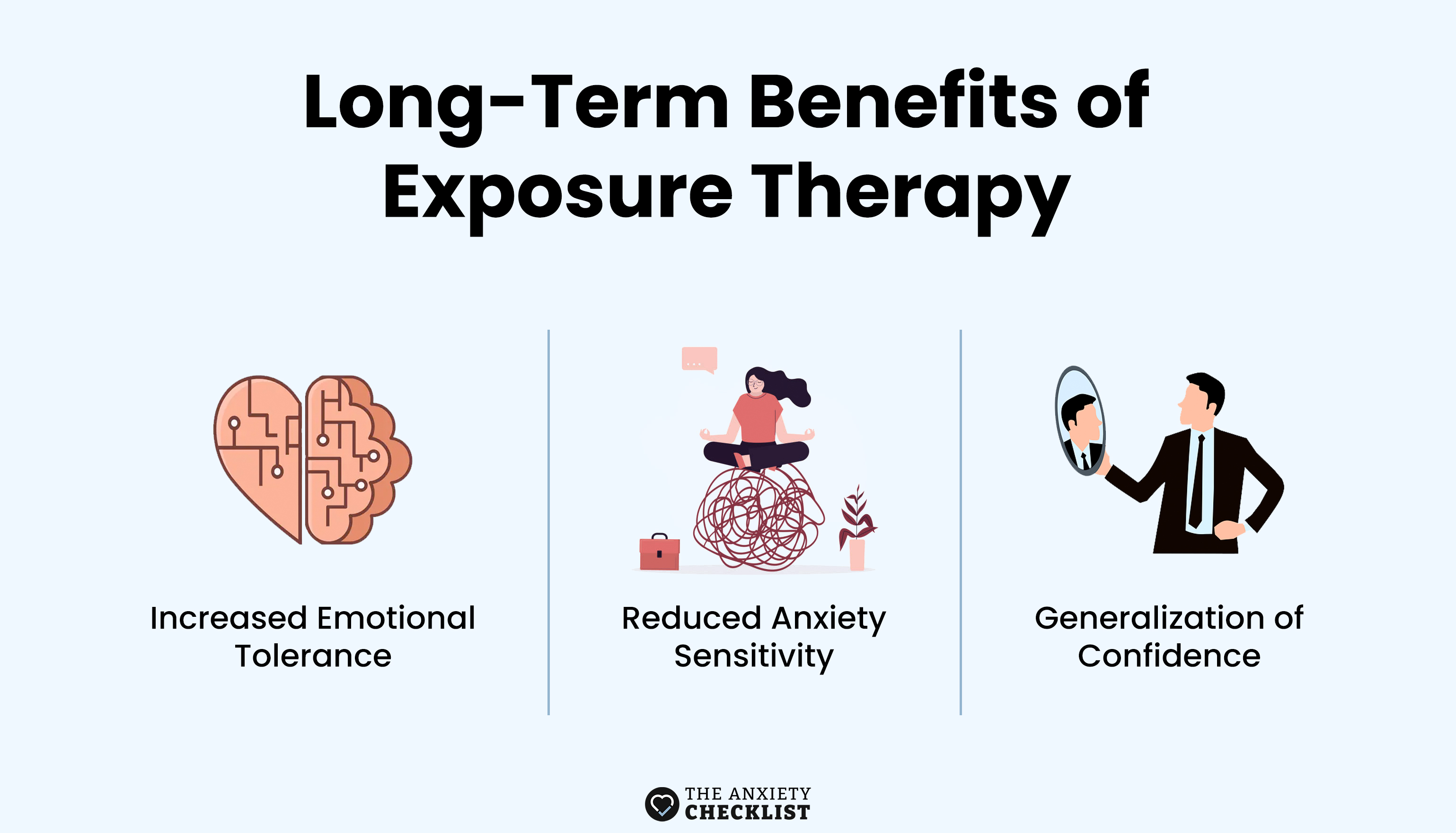
The benefits of exposure therapy extend well beyond the therapy room. By directly confronting their fears, clients gain (Buchholz & Abramowitz, 2020):
- Increased emotional tolerance: The ability to handle distress without avoidance or excessive safety behaviors.
- Reduced anxiety sensitivity: A decreased fear of physical sensations associated with anxiety, such as a racing heart or trembling.
- Generalization of confidence: Skills learned during exposure sessions often transfer to other areas of life, helping clients face challenges with greater resilience.
Exposure therapy remains a cornerstone of CBT due to its structured, systematic approach to dismantling fear. Through gradual exposure, clients develop not only a sense of mastery over their specific anxieties but also a deeper belief in their ability to face life’s uncertainties with confidence. By reducing avoidance behaviors and challenging anxious thoughts, exposure therapy empowers individuals to reclaim their lives and embrace a future free from the grip of fear (Buchholz & Abramowitz, 2020). Keep in mind that exposure therapy needs to be administered by an appropriately trained mental health professional.
Practical Coping Strategies
CBT equips clients with concrete tools for managing anxiety:
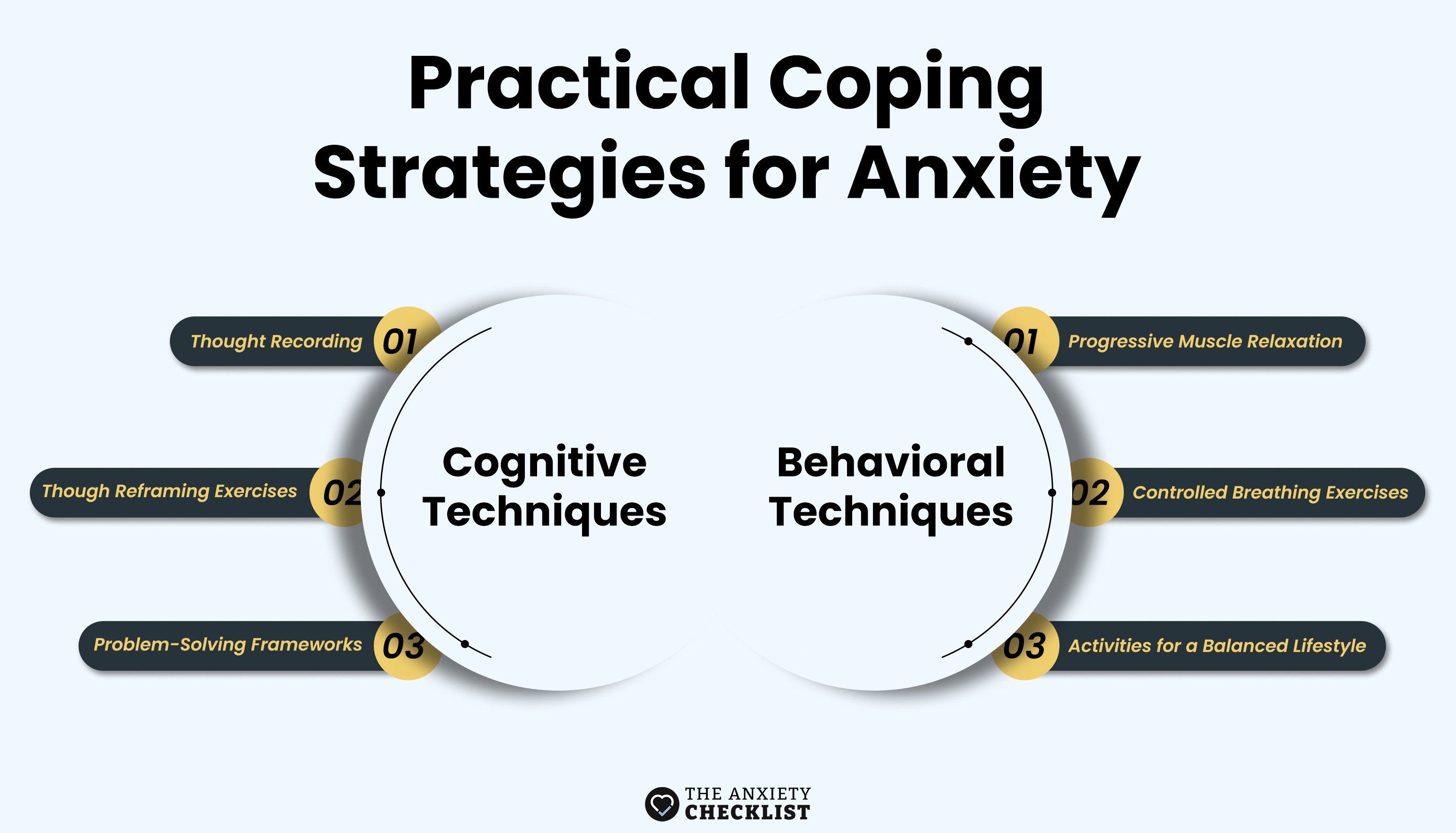
Cognitive Techniques:
Behavioral Techniques:
The Role of Professional Guidance
While self-help resources can be valuable, working with a qualified CBT therapist offers several key advantages:
Starting Your CBT Journey
- If you’re considering Cognitive Behavioral Therapy (CBT) to manage anxiety, you’re not alone. CBT is widely recognized as a highly effective approach for helping people break free from the cycle of anxious thoughts and behaviors. However, the path to starting therapy can feel overwhelming or expensive. That’s where AnxietyChecklist.com comes in—a comprehensive guide that delivers the same foundational psychoeducation therapists provide, with added elements of hypnosis and Neuro-Linguistic Programming (NLP) to deepen learning and create lasting change, all for a fraction of the cost.
A Smarter, More Accessible Way to Begin
- Many people spend significant time and money attending therapy sessions to learn the principles of CBT, and while therapy is valuable, AnxietyChecklist.com offers a more accessible starting point. Research backs that starting Designed to teach you how to recognize and manage anxiety effectively, this guide integrates traditional CBT techniques with hypnosis and NLP, empowering you to create shifts at both the conscious and unconscious levels.
Why AnxietyChecklist.com Stands Out:

Steps for Beginning Your Journey
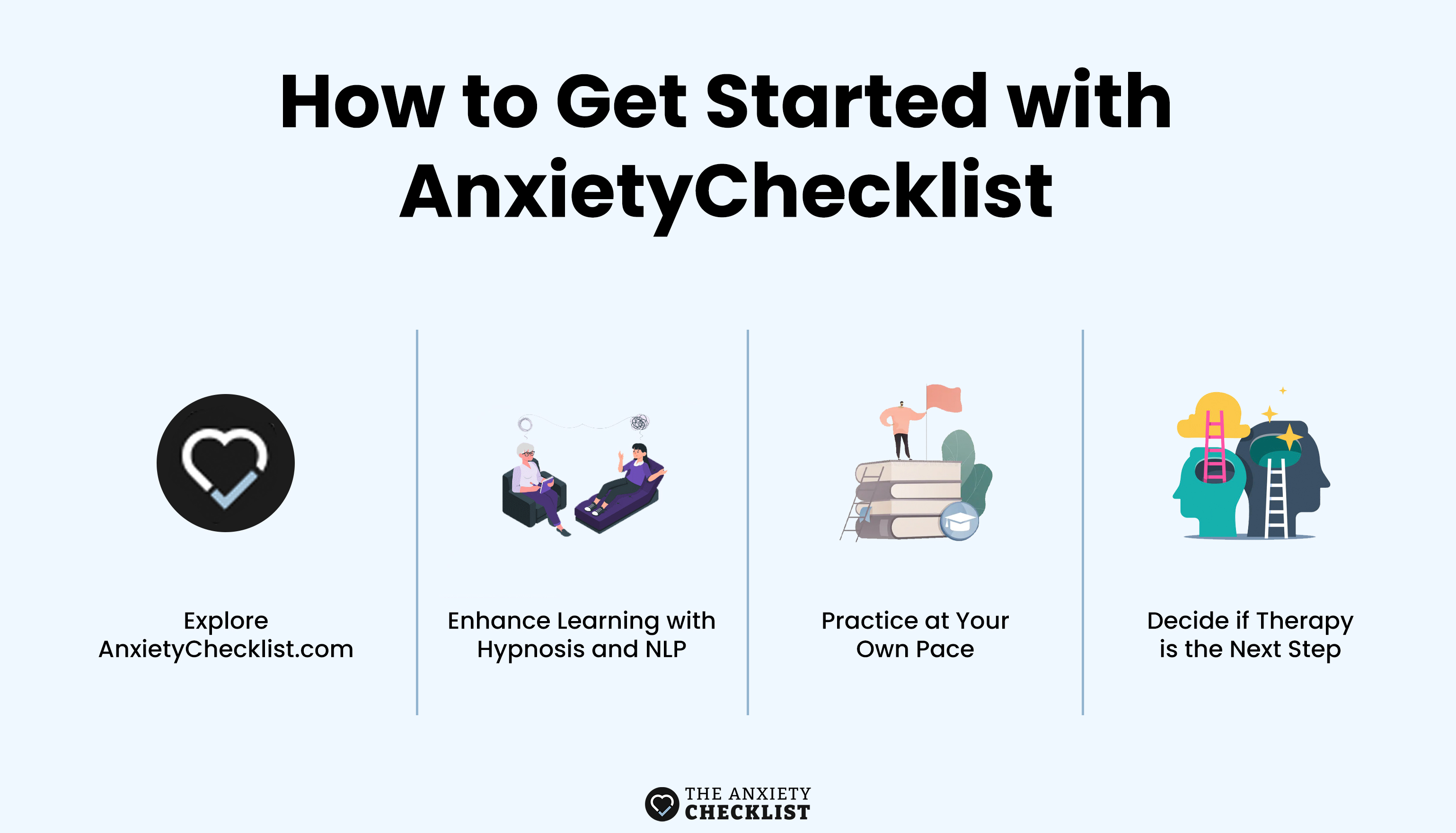
Why CBT, Hypnosis, and NLP Work Together
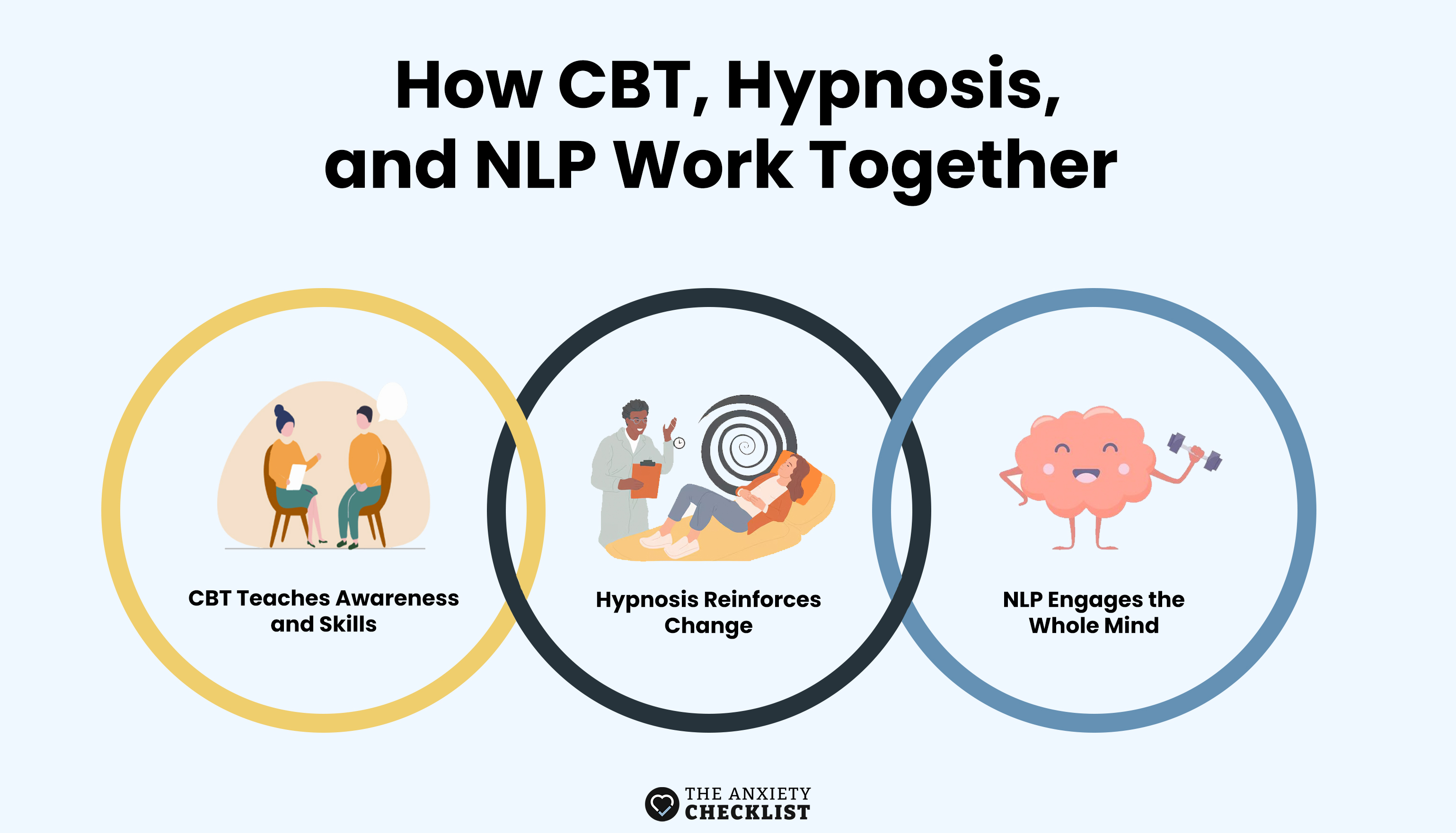
When integrated ethically and transparently, this blended approach can offer meaningful support for many individuals. However, it’s essential to recognize that CBT is the foundational evidence-based modality, while hypnosis and NLP should be understood as supplementary tools—not replacements for clinical therapy.
Your Next Step
The Evidence for Long-Term Success
Conclusion
- CBT offers a structured, evidence-based path to managing anxiety effectively. Through its combination of cognitive restructuring, behavioral techniques, and practical coping strategies, CBT empowers individuals to understand and manage their anxiety in lasting ways. While the journey may challenge you at times, the skills and insights gained through CBT can serve as lifelong tools for maintaining mental wellness.
Please note: While this article provides general information about CBT, it 's not a substitute for professional medical advice. If you're struggling with anxiety, consult with a qualified mental health professional who can provide personalized guidance and support.
If you are in a crisis or any other person may be in danger - don't use this site. These resources can provide you with immediate help.


